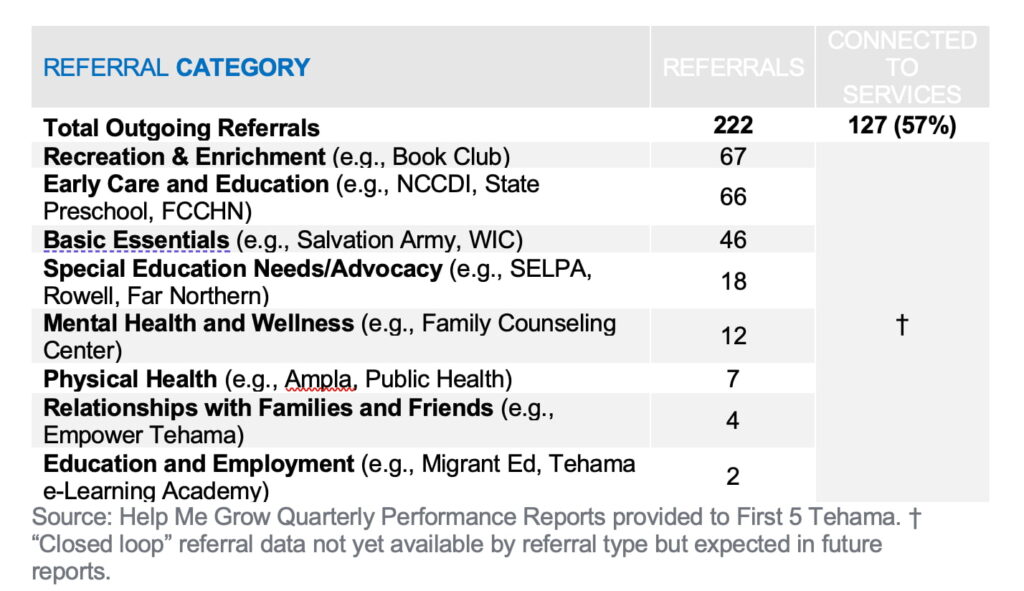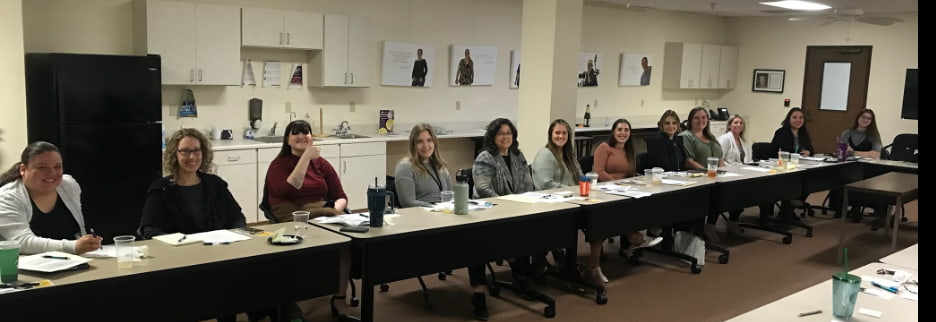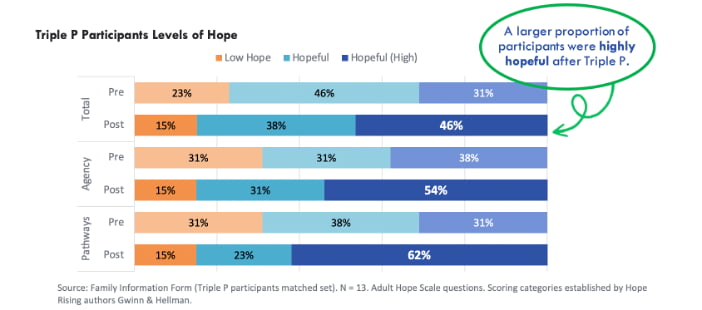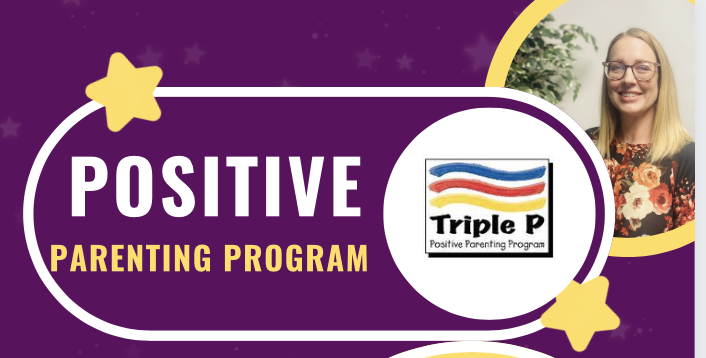
As promised, we return with the second installment of our Annual Reflection. As mentioned in our initial email, while the data highlights trends and issues, the narratives breathe life into the numbers. Continue reading to discover our next telling story, which centers on resources, relationships, and resilience in Tehama County.
Resources + Relationships = Resilience
“Firstly, ‘Are you okay?’ was aptly identified by Lifestyle as the quote of 2023. The simplicity of this question lies at the core of many initiatives and funded programs by First 5 Tehama. Lifestyle’s recognition of this quote underscores the realization in 2023 that acknowledging our own well-being before addressing any other task is paramount. The truth remains that many of us were and still are not okay. Acknowledging this to those around us is essential for addressing current challenges. This truth applies to children, families, educators, healthcare providers, and all community members. To cultivate resilience, we must prioritize building relationships, and to build relationships, we must ensure that basic resources are in place. The data indicates that many Tehama County families lack these fundamental resources.

*Tehama County poverty, child abuse, and domestic violence rates are far above the state average.
This data indicates that families need access to essential resources and stabilizing support at the local level before fully engaging in family strengthening, parenting education, and early education initiatives. The FY 2022-2023 report from First 5 Tehama underscores the effectiveness of the Help Me Grow system in addressing this need. During FY 2022-23, 2-1-1 Tehama (the Help Me Grow 24-hour hotline) experienced a doubling in the number of families contacting 211 to request services for children aged 0-5, resulting in 293 contacts. (Note that percentages may exceed 100% as callers may have identified multiple needs.)
- More than half (55%) had a housing need
- 27% indicated food-related needs
- 17% needed utility assistance
Following a seamless hand-off between 211 and TCDE’s Help Me Grow Departments, families were paired with a Help Me Grow navigator who served as their immediate case manager. Help Me Grow facilitated 222 outgoing referrals to various agencies. Of these, 127 resulted in successful service connections (57%), demonstrating a fully integrated and effective referral process. By employing this approach, families can access the necessary resources to establish the resilience required to persevere and thrive.

Andi, a 41-year-old mother of two with another child on the way, sought assistance by contacting the Help Me Grow (HMG) hotline after receiving its number from a local pastor. Having recently relocated to Tehama County following months of couch surfing and unsuccessful attempts to secure rental housing in Shasta County, Andi found herself residing in a motel with urgent needs for food and diapers. She was particularly worried about her 3-year-old child with Down Syndrome, who was eligible for services from the Far Northern Regional Center but had been unable to access them due to their unstable living situation. Additionally, Andi required prenatal care and needed a clinic to help provide health services.
Norma, a seasoned home visitor, shares thoughts from her initial visit, “I scheduled a resource visit for the same day that she called. On my way to the visit, I stopped by social services, grabbed an application for Cal Fresh and cash aid, and brought those along with diapers, formula, WIC information, a parent kit, and other types of information. She was delighted and relieved at the help and shared that she needed food and milk for her son and a stroller. She was very stressed and worried about the future and what would happen. I talked to her about all the different resources available and encouraged her to stay strong and focused. Over the next few weeks, the family became stable as we secured her a living situation at the Sale House and secured necessities through various agencies such as DSS and WIC.”
Andi expresses her appreciation, “This program has helped me when no one did. I did not know where to go or where to start. Tehama County has helped me and my family, and Help Me Grow has been there for me. I know I can count on Norma if I need her or have any questions.”
Considering Andi’s narrative and others akin to hers, it’s evident that stress plays a pivotal role in the success of interventions. Reducing stress levels enough to foster growth for both parents and children is imperative. Over the years, extensive research has demonstrated the Positive Parenting Program’s helpful impact, reducing stress and achieving the following benefits.
- Reduce stress in parents*
- Reduce the use of harsh discipline*
- Slow rates of child abuse**
- Reduce foster care placements**
*Sanders, M.R., Ralph, A., Sofronoff, K., Gardiner, P., Thompson, R., Dwyer, S., & Bidwell, K. (2008). Every Family: A population approach to reducing behavioral and emotional problems in children making the transition to school. Journal of Primary Prevention, 29, 197-222.
**Prinz, R.J., Sanders, M.R., Shapiro, C.J., Whitaker, D.J., & Lutzker, J.R. (2009). Population-based prevention of child maltreatment: The U.S. Triple P system population trial. Prevention Science, 10(1), 1-12.

Tehama parents are beginning to witness firsthand the advantages of these initiatives. In FY 2022-23, First 5 funded three Triple P courses. Triple P equips parents with simple and practical strategies to foster strong and healthy relationships with their children, effectively manage their behavior, and prevent developmental issues. Out of 44 participants who completed at least one Parenting Scale Assessment, 20 Triple P participants underwent pre-and post-tests. Among them, 85% (17 out of 20) demonstrated improvements in at least one domain.
Moreover, the group’s overall average Parenting Scale Score notably decreased from 3.1 to 2.7, indicating positive progress. Changes in the over-reactivity domain also proved statistically significant. (Due to the small sample size (N=20), interpret statistical significance cautiously.)

Successes like these build momentum in partnerships and enable us to support children and families to lean on and learn from each other. Community Capacity Coordinator Angela Brinkman shares a success after expanding her collaboration with Far Northern. “It was fantastic to share about Tehama and also make connections throughout the region for families that are mobile,” explained Brinkman.

The Triple P curriculum has benefitted families ranging from first-time parents to experienced childcare providers and teachers. One preschool teacher described, “I taught preschool, I’ve taken ECE classes, and there was still plenty for me to learn in this class! We also felt supported and connected to the community by taking this class. We learned about so many resources and applied for my son to go to Head Start. Triple P is such an asset to the community, I can’t speak highly enough about it.”
Moreover, 13 Triple P participants underwent a HOPE assessment at the beginning and end of the parenting education course. (Refer to our November story to revisit the HOPE science – HERE). At the start of the course, this group’s average HOPE score was 40.4, which increased to 42.6 upon course completion. The percentage of participants classified as “low hope” decreased from 23% to 15%, while those categorized as “highly hopeful” rose from 31% to 46%. Furthermore, the proportion of participants demonstrating high hope in the Pathways domain doubled from 31% to 62%.

Now that we have this new information, what does this story signify? First, let’s quickly recap what we now know:
- Tehama families are facing significant challenges related to poverty and family stability.
- It’s crucial to inquire, “Are you okay?” and ensure that families’ basic needs are met to foster their growth and enhance parenting skills.
- Relationship-based parenting support and education yield substantial benefits for children and families in Tehama County.
- There is a shortage of relationship-based parenting support services, with demand exceeding supply.
So, what’s our next step?
First 5 Tehama is committed to expanding the reach of the 0-5 programs. Overall, our organization served 953 children and 1,075 caregivers. This figure is less than 25% of the total 0–55-year-olds in Tehama County. While First 5 Tehama funding continues to decline, we are actively partnerships to leverage resources to expand and deepen the reach. First 5 Tehama and its funded programs will partner with school districts, health clinics, and other community-based organizations in new and innovative ways this year. It not only takes a village to raise a child, but it also takes a village to lift a community.
If you want to receive training or explore partnerships, please email Angela at abrinkman@first5tehama.com.
Positive Parenting Program is growing in capacity and sustainability. At the time of this writing, 18 providers were trained/accredited in the Triple P curriculum. In contrast, at the time of the 2022-2023 report, nine providers were trained/ accredited, which was already triple that of FY 2021-22 (3). First 5 Tehama will expand the support provided to these trained facilitators to continue fostering and growing opportunities for families to build relationships with each other and their facilitator to grow parenting strategies. HOPE Parenting Classes are now available and open online.

Thank you for dedicating time to absorb our second story in this two-part series. For further reflections, insights, and data, explore our Annual Report HERE. We eagerly anticipate sharing future successes and ongoing data updates throughout the year. Stay tuned for our return to your inbox in the coming months.

New Offering
We are proud to announce a Tehama County opportunity for family support professionals to decrease stress in parents and babies on their caseload through infant massage techniques. Join national trainer JoAnn Lewis, LMT, CEIM, for a 4-day infant massage instructor certification training. Infant massage has been shown to decrease parent stress, increase parent-child bonding, and increase parent confidence.
 April 29th and 30th + May 1st and 2nd
April 29th and 30th + May 1st and 2nd Red Bluff Community Center
Red Bluff Community Center Cost: 650 dollars per registered participant
Cost: 650 dollars per registered participant
REGISTER HERE

Upcoming Class
Join us for the next Positive Parenting Class beginning Feb 27th and March 18th. Registration is open now – HERE.


